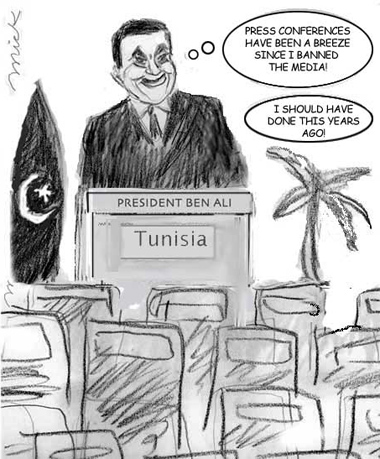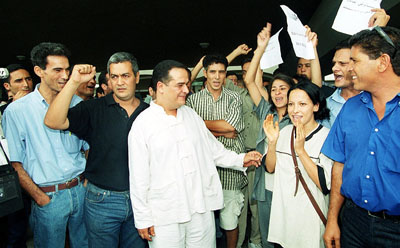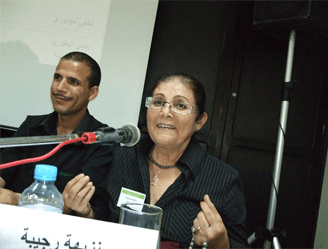
A perfect press conference in Tunisia
The government of President Zine El Abidine Ben Ali has made it clear there is little room for a critical press in Tunisia. Taking a cue from the government’s recent anti-press actions, CPJ cartoonist Mick Stern imagines the president’s “ideal” press conference. See more Mick Stern cartoons.
Tunisian airport officials confiscate CPJ publications
On Saturday, Tunis airport customs officials confiscated two copies of CPJ’s annual report, Attacks on the Press, as well as five copies of the Arabic-language translation of the Middle East and North Africa section of the book from Tunisian rights lawyer Mohamed Abbou and journalist Lotfi Hidouri on their return from Morocco, the two men told CPJ.

Ben Brik, still jailed in Tunisia: ‘Chains will certainly break!’
“When people want to live, destiny must surely respond. Darknesss will disappear, chains will certainly break!”Journalist Taoufik Ben Brik, 49, spurred admiration among his relatives and lawyers at a Tunis appeals court on Saturday when he chanted these two verses by Abou El Kacem Chebbi, Tunisia’s most well-known poet. This unexpected recitation of Chebbi’s verses,…

Tunisian journalist loses ‘airport immunity’ after award
My country’s international airport—as some may not know—has become the scene of the Tunisian regime’s score-settling with its opponents. Opponents are no longer banned from traveling; this is a move to promote the idea that they are “free.” However, if they do travel, they face difficulties at the airport, port, or border crossing in question.

Seen and heard at CPJ benefit: ‘The pen is not broken’
Small in stature but strong in her words, Naziha Réjiba tells a reporter of all the things the Tunisian government does to try to frighten her. But Réjiba said that she will not be scared, that she will never allow such tactics to have power over her. Editor of Kalima, an online news Web site blocked in…

A Tunisian blogger speaks out: ‘The candles are lit’
My country’s government brags unabashedly that it has not passed any laws that require government authorization to establish an electronic publication or a Web site or a blog on the Internet. Those that cheerlead for this government rely on this point to propagate the lie they call “the freedom to publish electronically” in Tunisia.
After advocacy, Tunisian sees end of cruel punishment
The government’s cruel treatment of Tunisian journalist Abdallah Zouari came to an end on August 1, a reminder that even the most autocratic regimes will yield to international pressure for press freedom. Zouari, a former reporter for the now-defunct Islamic weekly Al-Fajr, had been forced to live under a form of house arrest since his…
A blogger in Tunisia: My life with the censor
The specter of government opposition to blogging, journalism, and free expression in general in Tunisia is so intense that the mere appearance of a specific name online is enough to push the government to block the Web site where it appears, even if that site is not critical of the government.
After CPJ letter, Tunis grants journalist freedom to travel
Nearly a week after CPJ sent a letter to Tunisian President Zine El Abidine Ben Ali urging him to end the “ongoing cycle of repression of critical journalists and media outlets,” Tunisia’s Ministry of Justice and Human Rights told Mohamed Abbou, a prominent human rights lawyer and writer, in a phone call on Saturday that…

Tunisian president calls criticism “unbecoming”
During his address to the nation on the anniversary of Tunisia’s independence on March 20, President Zine El Abidine Ben Ali did not hesitate to reject critical journalism and the right of journalists to cover corruption or mistakes by the government. As customary, local groups concerned with press freedom, including the Tunisian Observatory for Press Freedom…